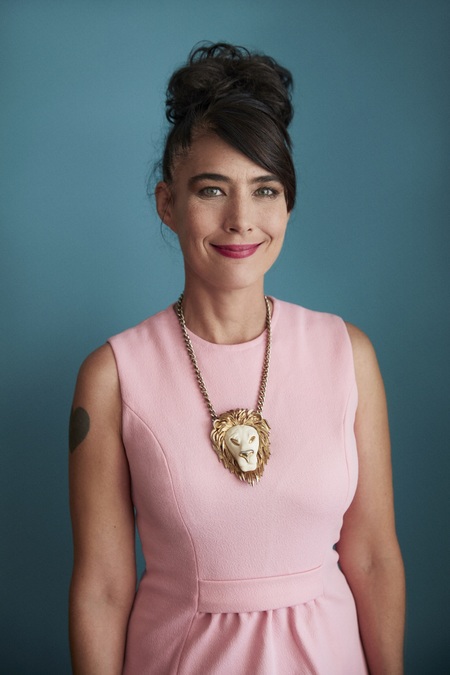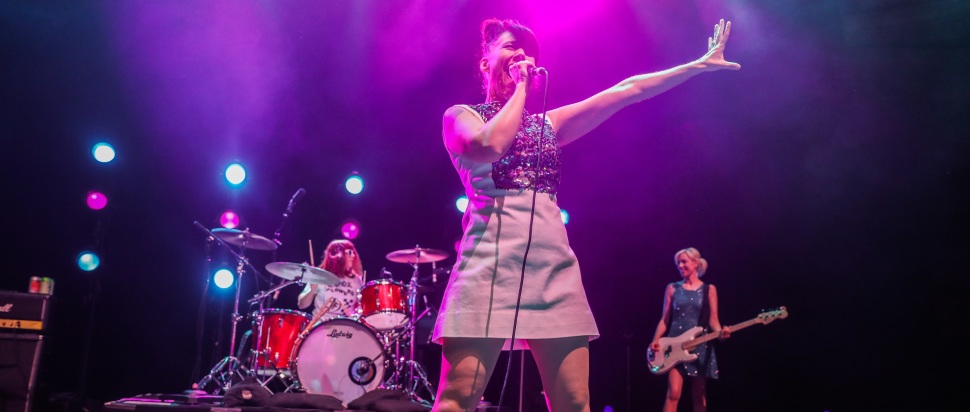Grrrl Power: Kathleen Hanna on the return of Bikini Kill
Frontrunners for the riot grrrl feminist movement in the 90s, Bikini Kill are back. And while their manifesto remains the same, frontwoman Kathleen Hanna has worked through a thing or two
Somewhere in the belly of Brixton Academy in 2019, as the last of the sweaty throng wades through the plastic beer cups littering the stalls, Kathleen Hanna is crying. The punk singer has just performed the second of two much-anticipated reunion shows for her band Bikini Kill, a group that spearheaded the riot grrrl feminist movement. She’s had a good time. The fans in the audience who never believed this milestone moment would happen have had a ridiculously good time. And yet there’s an unwelcome energy.
“I'm on cloud nine,” she recalls from her home in sunny Pasadena, California, her small wire-haired dog Terry sprawled out on the bed sheets behind her. “But then someone made this disparaging comment about my performance so when I went backstage to start wrapping up, I sat there and cried.” Hanna, who fronts the band alongside bassist Kathi Wilcox and drummer Tobi Vail, is no stranger to snide comments. During their heyday in the 90s, Bikini Kill’s provocative and powerful performances repeatedly faced abuse and disrespect from male fans and club workers. Male journalists accused her of reverse sexism in their interviews together.
“But I'm saying this as a positive thing,” she insists. “Because back then, when people were constantly saying stuff like that, I had to have this armour where I couldn't have any feelings about it.” At this show in question, Hanna is found by her bandmate Vail who asks what’s going on before clutching her by the shoulders and reasoning, 'If someone said that about me, I'd be crying too!' “It made me feel so fucking validated,” continues Hanna. “That’s so different from Bikini Kill in the 90s, where we didn't have time to make space for each other. I wrote a lot of the Riot Grrrl Manifesto but I didn't live it until now. I'm getting to the point where I'm living up to the potential in my writing.”
For the uninitiated, the Riot Grrrl Manifesto appeared in Bikini Kill’s second zine and was published in 1991, shortly after the trio (and guitarist at the time Billy Karren, aka Billy Boredom) formed the band in Olympia, Washington. At this point on the West Coast of America, the indie scene was heavily male-dominated with the grunge scene exploding about an hour’s drive away in Seattle. Hard rockers Alice In Chains boasted aggressively crimped bouffant hairstyles and even heavier riffs. Sub Pop-signed TAD posed by tractors and brandished huge chainsaws in their press shots. So when Bikini Kill landed with their debut Revolution Girl Style Now, their scrappy, riotous punk jibes felt like a siren sounding for change.
Inspired by seeing sludgy, fellow all-femme rockers Babes in Toyland play live, Bikini Kill attempted to forge an underground network between girls who played music, put on shows, and made fanzines creating a forum for female voices. Because, as the manifesto argues, 'We wanna make it easier for girls to see/hear each other's work so that we can share strategies and criticize-applaud each other.' For a band that only technically put out three records (there are a couple of compilations of the first two records and the singles for your convenience), Bikini Kill certainly racked up those plaudits. After seven years on the circuit and just a handful of shows here in the UK though, the band called it quits citing burnout and widespread hate from the media as key components of their dissolution.
Then in 2017, two decades on from their last performance, something was cooking at The Kitchen in New York. Contributing Editor at Pitchfork, Jenn Pelly released her 33 1/3 book on post-punk godmothers The Raincoats. Following the standard Q&A session, the group surprised everyone with a live performance alongside their original drummer Palmolive of The Slits. Not only that, but Bikini Kill briefly reunited for the first time in 20 years to perform album closer, For Tammy Rae from 1993’s Pussy Whipped. The one-off performance didn’t come easily though as Hanna explains, crediting Wilcox for making it happen. “She is the secret weapon in every situation. She's that kind of person who’s like, ‘It needs to happen’ and she makes it happen.”
She continues: “At first, I said no because I live on the West Coast. I can't travel for one song. But then I was like, 'What the fuck did I just do?'” Despite the long-distance setup, the reunion sparked something between the old friends. Hanna sheepishly admits they began “sneaking around” together. “We practised in secret. We're not super famous but we were in Greenpoint, Brooklyn. I mean, if we're gonna get recognised anywhere!” Holed up in their pal Sarah Landeau’s practice space (also founding member and lead guitarist of Hanna’s other project, The Julie Ruin), the initial rehearsals were testing the waters rather than leveraging nostalgia to make a quick buck.
“I would never have set up a gig and then got together because I don't want to find out in the first practice that I don't like these songs anymore, [or that] they don't have relevance to me, [or] I have to play a 25-year-old version of myself to sing them. That would have been horrific,” exclaims Hanna. While piecing the parts of their set back together might’ve been fragmented (Hanna shares that this included downloading and correcting her original lines from lyrics.com alongside matching up fills and structures from original YouTube clips), Bikini Kill’s signature blend of politics and punk was unwavering. “It was obvious so quickly that the material still felt incredibly relevant,” Hanna says, adamantly. “I'm not only singing them from the point of like, 'Fuck you!' I'm singing them from the point of, 'I'm a part of this'. I'm not just a survivor or a victim who's angry, I'm also singing to the monster in myself.”
While the reunion with Wilcox and Vail was empowering, there was also a sad undercurrent. In the wake of wider women’s marches in the States and the rising prominence of the #MeToo movement, it seemed the gross misogyny that Bikini Kill encountered daily had permeated into countless other decades, even a new millennium. Hanna’s unsurprisingly reflective. “I think there was a little bit of hope that I would feel like, ‘Oh, I've worked in therapy and journalled so much that this song about a liberal guy in the scene who is a rapist is going to feel so old to me, and then I'm singing it and I'm feeling every single feeling I felt in the 90s and then everything I feel now added into it.’”

Kathleen Hanna. Photo: Jason Frank Rothenberg
If the sociopolitics have failed to develop over time, Hanna’s own personal growth has been far from stunted. When the singer became the lightning rod for riot grrrl’s radical feminist ideologies, she also faced growing criticism of its whiteness. But by her mid-40s, Hanna was painfully aware of the double standards. “A lot of the songs where I'm angry at white men have turned back to me. Like, how have I been the Star Bellied Boy to someone else as a white person? How have I been the person who seems like, 'Oh, I'm so cool and liberal', but then said or done something that made someone else feel excluded?” In a series of lectures delivered on college campuses in her mid-40s, she directed students to the academic and zine author Mimi Thi Nguyen’s critique of the movement – Riot Grrrl, Race and Revival.
I’m curious then whether Hanna, now 55, still believes (as stated in the manifesto) that "Girls constitute a revolutionary soul force that can and will, change the world for real?” Her answer is a mic drop moment before she bows out of our call. “I do believe it but I believe that it has to be led by BIPOC women. I don't think girls can change shit if they don't have an intersectional lens. The future of punk is not white.”
Bikini Kill play O2 Academy Glasgow, 14 Jun, support from R.AGGS
Kathleen Hanna's book Rebel Girl: My Life As a Feminist Punk is out now via William Collins
bikinikill.com / kathleenhannaofficial.com
